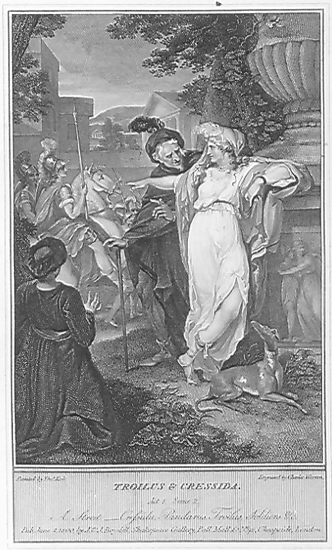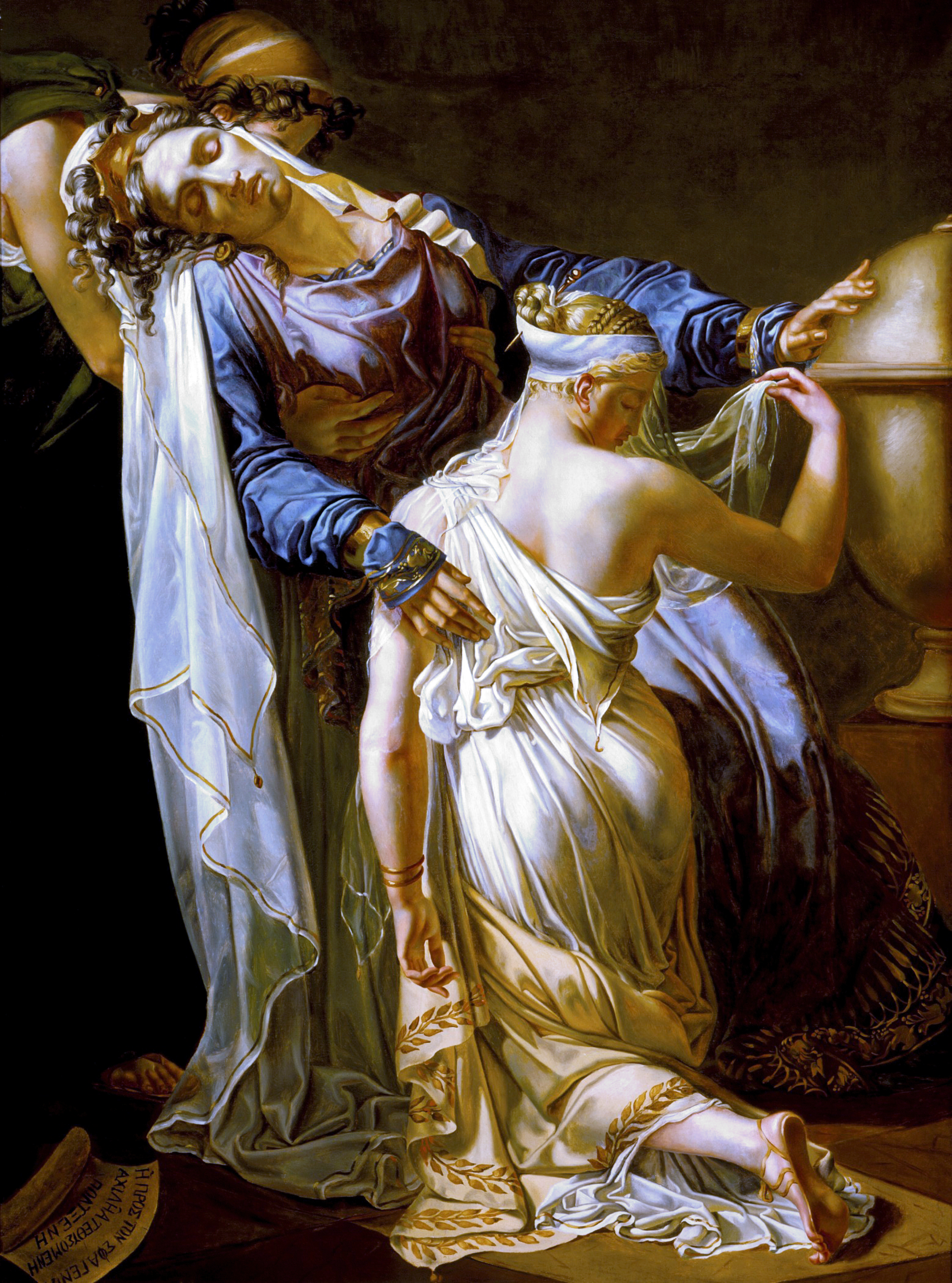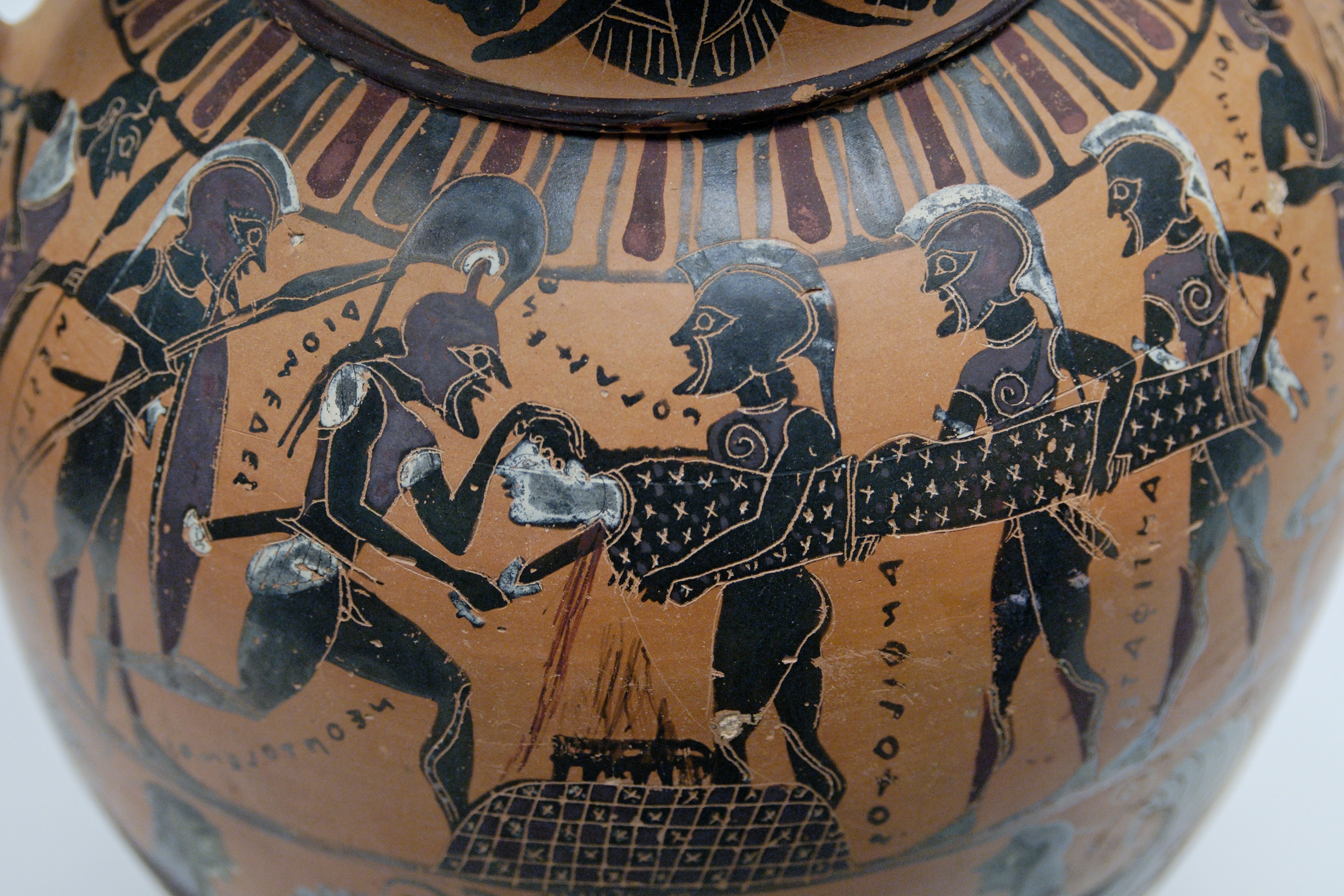|
Troilus
Troilus ( or ; grc, Τρωΐλος, Troïlos; la, Troilus) is a legendary character associated with the story of the Trojan War. The first surviving reference to him is in Homer's ''Iliad,'' composed in the late 8th century BCE. In Greek mythology, Troilus is a young Trojan prince, one of the sons of King Priam (or Apollo) and Hecuba. Prophecies link Troilus' fate to that of Troy and so he is ambushed and murdered by Achilles. Sophocles was one of the writers to tell this tale. It was also a popular theme among artists of the time. Ancient writers treated Troilus as the epitome of a dead child mourned by his parents. He was also regarded as a paragon of youthful male beauty. In Western European medieval and Renaissance versions of the legend, Troilus is the youngest of Priam's five legitimate sons by Hecuba. Despite his youth he is one of the main Trojan war leaders. He dies in battle at Achilles' hands. In a popular addition to the story, originating in the 12th century, Tr ... [...More Info...] [...Related Items...] OR: [Wikipedia] [Google] [Baidu] |
Cressida
Cressida (; also Criseida, Cresseid or Criseyde) is a character who appears in many Medieval and Renaissance retellings of the story of the Trojan War. She is a Trojan woman, the daughter of Calchas, a Greek seer. She falls in love with Troilus, the youngest son of King Priam, and pledges everlasting love, but when she is sent to the Greeks as part of a hostage exchange, she forms a liaison with the Greek warrior Diomedes. In later culture she becomes an archetype of a faithless lover. Character history The character's name is derived from that of Chryseis, a character who appears in the ''Iliad'' but has no connection with Troilus, Diomedes or Calchas. Indeed, the story of Troilus and Cressida does not appear in any Greek legends but was invented by the twelfth century French poet Benoît de Sainte-Maure in the '' Roman de Troie''. The woman in the love triangle is here called not Cressida but Briseida, a name derived from that of Briseis, a different character in the ''Iliad'' ... [...More Info...] [...Related Items...] OR: [Wikipedia] [Google] [Baidu] |
Akhilleus Louvre CA6113
In Greek mythology, Achilles ( ) or Achilleus ( grc-gre, Ἀχιλλεύς) was a hero of the Trojan War, the greatest of all the Greek warriors, and the central character of Homer's ''Iliad''. He was the son of the Nereid Thetis and Peleus, king of Phthia. Achilles' most notable feat during the Trojan War was the slaying of the Trojan prince Hector outside the gates of Troy. Although the death of Achilles is not presented in the ''Iliad'', other sources concur that he was killed near the end of the Trojan War by Paris, who shot him with an arrow. Later legends (beginning with Statius' unfinished epic ''Achilleid'', written in the 1st century AD) state that Achilles was invulnerable in all of his body except for one heel, because when his mother Thetis dipped him in the river Styx as an infant, she held him by one of his heels. Alluding to these legends, the term "Achilles' heel" has come to mean a point of weakness, especially in someone or something with an otherwise strong c ... [...More Info...] [...Related Items...] OR: [Wikipedia] [Google] [Baidu] |
Achilles
In Greek mythology, Achilles ( ) or Achilleus ( grc-gre, Ἀχιλλεύς) was a hero of the Trojan War, the greatest of all the Greek warriors, and the central character of Homer's '' Iliad''. He was the son of the Nereid Thetis and Peleus, king of Phthia. Achilles' most notable feat during the Trojan War was the slaying of the Trojan prince Hector outside the gates of Troy. Although the death of Achilles is not presented in the ''Iliad'', other sources concur that he was killed near the end of the Trojan War by Paris, who shot him with an arrow. Later legends (beginning with Statius' unfinished epic ''Achilleid'', written in the 1st century AD) state that Achilles was invulnerable in all of his body except for one heel, because when his mother Thetis dipped him in the river Styx as an infant, she held him by one of his heels. Alluding to these legends, the term " Achilles' heel" has come to mean a point of weakness, especially in someone or something with an otherwise ... [...More Info...] [...Related Items...] OR: [Wikipedia] [Google] [Baidu] |
Chaucer
Geoffrey Chaucer (; – 25 October 1400) was an English poet, author, and civil servant best known for '' The Canterbury Tales''. He has been called the "father of English literature", or, alternatively, the "father of English poetry". He was the first writer to be buried in what has since come to be called Poets' Corner, in Westminster Abbey. Chaucer also gained fame as a philosopher and astronomer, composing the scientific ''A Treatise on the Astrolabe'' for his 10-year-old son Lewis. He maintained a career in the civil service as a bureaucrat, courtier, diplomat, and member of parliament. Among Chaucer's many other works are ''The Book of the Duchess'', ''The House of Fame'', ''The Legend of Good Women'', and ''Troilus and Criseyde''. He is seen as crucial in legitimising the literary use of Middle English when the dominant literary languages in England were still Anglo-Norman French and Latin. Chaucer's contemporary Thomas Hoccleve hailed him as "the firste fyndere of ou ... [...More Info...] [...Related Items...] OR: [Wikipedia] [Google] [Baidu] |
Apollo
Apollo, grc, Ἀπόλλωνος, Apóllōnos, label=genitive , ; , grc-dor, Ἀπέλλων, Apéllōn, ; grc, Ἀπείλων, Apeílōn, label= Arcadocypriot Greek, ; grc-aeo, Ἄπλουν, Áploun, la, Apollō, la, Apollinis, label=genitive, , ; , is one of the Olympian deities in classical Greek and Roman religion and Greek and Roman mythology. The national divinity of the Greeks, Apollo has been recognized as a god of archery, music and dance, truth and prophecy, healing and diseases, the Sun and light, poetry, and more. One of the most important and complex of the Greek gods, he is the son of Zeus and Leto, and the twin brother of Artemis, goddess of the hunt. Seen as the most beautiful god and the ideal of the ''kouros'' (ephebe, or a beardless, athletic youth), Apollo is considered to be the most Greek of all the gods. Apollo is known in Greek-influenced Etruscan mythology as ''Apulu''. As the patron deity of Delphi (''Apollo Pythios''), Apollo is an o ... [...More Info...] [...Related Items...] OR: [Wikipedia] [Google] [Baidu] |
Hecuba
Hecuba (; also Hecabe; grc, Ἑκάβη, Hekábē, ) was a queen in Greek mythology, the wife of King Priam of Troy during the Trojan War. Description Hecuba was described by the chronicler Malalas in his account of the ''Chronography'' as "dark, good eyes, full grown, long nose, beautiful, generous, talkative, calm". Meanwhile, in the account of Dares the Phrygian, she was illustrated as ". . .beautiful, her figure large, her complexion dark. She thought like a man and was pious and just." Family Parentage Ancient sources vary as to the parentage of Hecuba. According to Homer, Hecuba was the daughter of King Dymas of Phrygia, but Euripides and Virgil write of her as the daughter of the Thracian king Cisseus. The mythographers Pseudo-Apollodorus and Hyginus leave open the question which of the two was her father, with Pseudo-Apollodorus adding a third alternative option: Hecuba's parents could as well be the river god Sangarius and Metope. Some versions from non-extant ... [...More Info...] [...Related Items...] OR: [Wikipedia] [Google] [Baidu] |
Polyxene Troilos Louvre CA6113
In Greek mythology, Polyxena (; Greek: ) was the youngest daughter of King Priam of Troy and his queen, Hecuba. She does not appear in Homer, but in several other classical authors, though the details of her story vary considerably. After the fall of Troy, she dies when sacrificed by the Greeks on the tomb of Achilles, to whom she had been betrothed and in whose death she was complicit in many versions. Description Polyxene was described by the chronicler Malalas in his account of the ''Chronography'' as "tall, pure, very white, large-eyed, black-haired, with her hair worn long behind, a good nose and cheeks, blooming-lipped, small-footed, virgin, charming, very beautiful, 18 years old when they killed her". Meanwhile, in the account of Dares the Phrygian, she was illustrated as ". . .fair, tall, and beautiful. Her neck was slender, her eyes lovely her hair blond and long, her body well-proportioned, her fingers tapering, her legs straight, and her feet the best. Surpassing ... [...More Info...] [...Related Items...] OR: [Wikipedia] [Google] [Baidu] |
Shakespeare
William Shakespeare ( 26 April 1564 – 23 April 1616) was an English playwright, poet and actor. He is widely regarded as the greatest writer in the English language and the world's pre-eminent dramatist. He is often called England's national poet and the " Bard of Avon" (or simply "the Bard"). His extant works, including collaborations, consist of some 39 plays, 154 sonnets, three long narrative poems, and a few other verses, some of uncertain authorship. His plays have been translated into every major living language and are performed more often than those of any other playwright. He remains arguably the most influential writer in the English language, and his works continue to be studied and reinterpreted. Shakespeare was born and raised in Stratford-upon-Avon, Warwickshire. At the age of 18, he married Anne Hathaway, with whom he had three children: Susanna, and twins Hamnet and Judith. Sometime between 1585 and 1592, he began a successful career in London as ... [...More Info...] [...Related Items...] OR: [Wikipedia] [Google] [Baidu] |
Trojan War
In Greek mythology, the Trojan War was waged against the city of Troy by the Achaeans (Greeks) after Paris of Troy took Helen from her husband Menelaus, king of Sparta. The war is one of the most important events in Greek mythology and has been narrated through many works of Greek literature, most notably Homer's ''Iliad''. The core of the ''Iliad'' (Books II – XXIII) describes a period of four days and two nights in the tenth year of the decade-long siege of Troy; the ''Odyssey'' describes the journey home of Odysseus, one of the war's heroes. Other parts of the war are described in a cycle of epic poems, which have survived through fragments. Episodes from the war provided material for Greek tragedy and other works of Greek literature, and for Roman poets including Virgil and Ovid. The ancient Greeks believed that Troy was located near the Dardanelles and that the Trojan War was a historical event of the 13th or 12th century BC, but by the mid-19th century AD, bot ... [...More Info...] [...Related Items...] OR: [Wikipedia] [Google] [Baidu] |
Diomedes
Diomedes (Jones, Daniel; Roach, Peter, James Hartman and Jane Setter, eds. ''Cambridge English Pronouncing Dictionary''. 17th edition. Cambridge UP, 2006.) or Diomede (; grc-gre, Διομήδης, Diomēdēs, "god-like cunning" or "advised by Zeus") is a hero in Greek mythology, known for his participation in the Trojan War. He was born to Tydeus and Deipyle and later became King of Argos, succeeding his maternal grandfather, Adrastus. In Homer's ''Iliad'' Diomedes is regarded alongside Ajax the Great and Agamemnon, after Achilles, as one of the best warriors of all the Achaeans in prowess (which is especially made clear in Book 7 of the ''Iliad'' when Ajax the Greater, Diomedes, and Agamemnon are the most wished for by the Achaeans to fight Hector out of nine volunteers, who included Odysseus and Ajax the Lesser). Subsequently, Diomedes founded ten or more Italian cities and, after his death, was worshipped as a divine being under various names in both Italy and Greece ... [...More Info...] [...Related Items...] OR: [Wikipedia] [Google] [Baidu] |
Iliad
The ''Iliad'' (; grc, Ἰλιάς, Iliás, ; "a poem about Ilium") is one of two major ancient Greek epic poems attributed to Homer. It is one of the oldest extant works of literature still widely read by modern audiences. As with the '' Odyssey'', the poem is divided into 24 books and contains 15,693 lines in its most widely accepted version, and was written in dactylic hexameter. Set towards the end of the Trojan War, a ten-year siege of the city of Troy by a coalition of Mycenaean Greek states, the poem depicts significant events in the siege's final weeks. In particular, it depicts a fierce quarrel between King Agamemnon and a celebrated warrior, Achilles. It is a central part of the Epic Cycle. The ''Iliad'' is often regarded as the first substantial piece of European literature. The ''Iliad'', and the ''Odyssey'', were likely written down in Homeric Greek, a literary amalgam of Ionic Greek and other dialects, probably around the late 8th or early 7th century BC. ... [...More Info...] [...Related Items...] OR: [Wikipedia] [Google] [Baidu] |
Priam
In Greek mythology, Priam (; grc-gre, Πρίαμος, ) was the legendary and last king of Troy during the Trojan War. He was the son of Laomedon. His many children included notable characters such as Hector, Paris, and Cassandra. Etymology Most scholars take the etymology of the name from the Luwian 𒉺𒊑𒀀𒈬𒀀 (Pa-ri-a-mu-a-, or “exceptionally courageous”), attested as the name of a man from Zazlippa, in Kizzuwatna. A similar form is attested transcribed in Greek as ''Paramoas'' near Kaisareia in Cappadocia. Some have identified Priam with the historical figure of Piyama-Radu, a warlord active in the vicinity of Wilusa. However, this identification is disputed, and is highly unlikely, given that he was known in Hittite records as being an ally of the Ahhiyawa against Wilusa. A popular folk etymology derives the name from the Greek verb , meaning 'to buy'. This in turn gives rise to a story of Priam's sister Hesione ransoming his freedom, with a golden veil ... [...More Info...] [...Related Items...] OR: [Wikipedia] [Google] [Baidu] |









